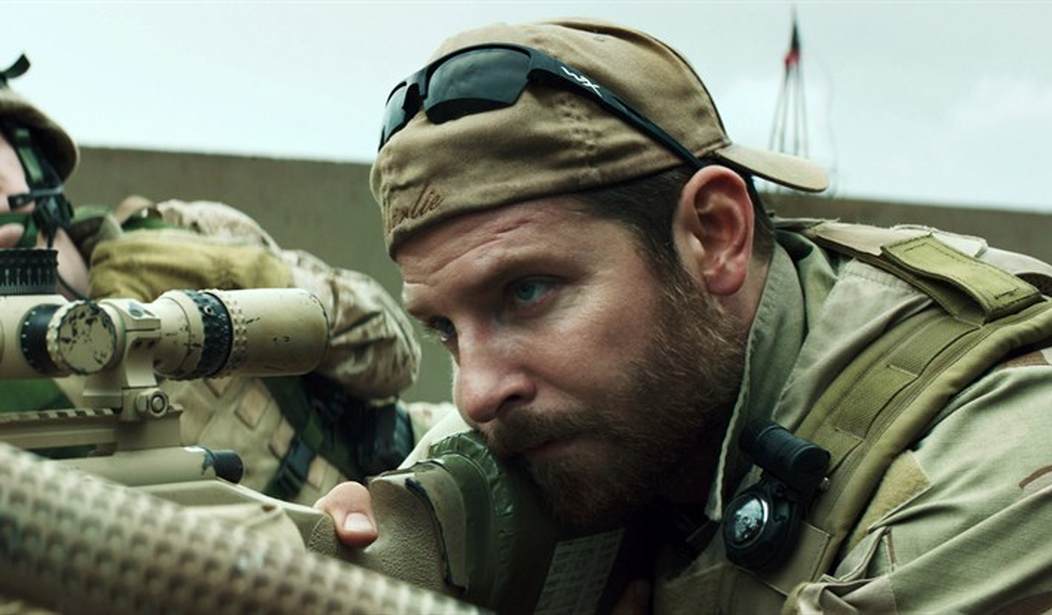Editor's note: This article is cross-posted at JohnHanlonReviews.com.
Do you support the war on Terror and, more specifically, the war in Iraq? How do you feel about snipers and the plight of the American soldier? On a more personal note, what are your thoughts on Chris Kyle, reportedly the deadliest sniper in U.S. military history?
Those three questions are valid and open for debate. Unfortunately, though, all three have become remarkably intertwined in the debate over the quality of the new film American Sniper.
Last Friday, the Clint Eastwood-helmed film American Sniper arrived in theaters banking over a hundred million dollars. Many conservatives embraced the film while some liberals lambasted it — but why? Many reactions to the film were politically-driven, despite Eastwood and Bradley Cooper (who plays Kyle in the film) arguing the film isn't political.
Much of the controversy about the film stems from the disparate opinions of Kyle, the feature’s subject, who wrote the book the film was adapted from. Kyle’s memoir focused on his training as a Navy SEAL, his experiences as a sniper in Iraq and his post-military life. Tragically, in 2013, a few years after leaving the battlefield, Kyle was killed by a former Marine who was reportedly suffering from post-traumatic stress disorder.
After the film's release, The Guardian’s Lindy West wrote a piece entitled “The real American Sniper was a hate-filled killer. Why are simplistic patriots treating him as a hero?” while director Michael Moore tweeted “snipers aren’t heroes.” Many on the left and right were offended by West’s piece and by Moore’s criticism of a man who heroically served four tours of duty in Iraq when his country asked him to.
Adding to that, the New Republic’s Dennis Jett admitted that he hadn’t seen the film but decided to add his own take on the film. “If the trailer is any indication,” he wrote, “Eastwood’s film, like Zero Dark Thirty, tries to make a straightforward situation more complex than it is. “ Jett argued that the film might have misrepresented Kyle — based on a clip he found from the film. (The obvious hypocrisy of questioning the cinematic representation of a soldier in a movie he didn’t see eluded him).
Recommended
It’s inarguable, though, that all of Chris Kyle’s life wasn’t depicted in the movie. Of the eight best picture Oscar nominees of 2015, four of them (The Theory of Everything, The Imitation Game, Selma, and American Sniper) were based on true stories. Of the four, only Selma faced the type of public outcry that American Sniper did and much of that controversy stemmed from the depiction of Lyndon Baines Johnson in the film itself.
With American Sniper, much of the controversy has focused on Kyle’s claims outside of the movie’s story. Slate.com, for instance, recently referred to Kyle as an “American liar” and detailed some of the claims Kyle made after publishing the book. One of the claims referred to a bar fight with former Gov. Jesse Ventura, a story Ventura successfully argued in court was inaccurate. It seems strange, however, that Sniper has faced more scrutiny about its hero than the subjects of other stories based on real events did.
It was only a few weeks ago that Angelina Jolie’s Unbroken opened with little criticism of its main character, Louis Zamperini. Zamperini, like Kyle (who is seen in the feature suffering from post-traumatic stress disorder), was a war hero who came back from the battlefield a scarred man. In a recent interview, Zamperini’s son Luke noted that it wasn’t until he witnessed a Billy Graham sermon in 1949 that his father changed his life. Luke said that “After his conversion, he was done getting drunk. He was done fighting.”
Few people have criticized Unbroken for ignoring Zamperini’s alcoholism and how he reportedly nearly ruined his marriage after the war (for the record, some did note that Zamperini’s story of personal redemption was ignored). Zamperini’s temperament and alcoholism was just seen as outside the purview of the story that Jolie wanted to tell.
Eastwood, meanwhile, was criticized by mainstream publications for only telling the part of Kyle’s story he wanted to tell.
It seems strange that Unbroken was seen as a straight-forward narrative about one soldier’s life while American Sniper was viewed as a political movie that celebrated Chris Kyle. For those who have seen the film itself, it operates more as a character study than as a war film and doesn’t really focus on political debates. It is, however, less cynical of the war itself than other films have been. That’s for a good reason. This story is about one soldier’s true story and not the entire war and therefore wouldn’t include such a debate.
Unfortunately, the film has fostered a mostly-partisan political debate with some on the right claiming it as their own and others (including Seth Rogen, who compared it to a Nazi propaganda film) attacking it. It’s unfortunate though that this film has become unwilling fodder for the culture wars.
As a film critic, I would argue that liberals who oppose the war in Iraq and who question some of Kyle’s claims could enjoy it. So too could conservatives who supported the war in Iraq and have few doubts about the veracity of Kyle’s claims.
For the record, I’m also glad that Jane Fonda and Rosie O’Donnell, two critics of the war in Iraq, came out in support of the film. That, of course, doesn’t mean that either of them support the war or every claim that Kyle made in his entire life.
It just means that they were open-minded enough to see the movie for what it was: a movie. I only wish that more people were more willing to do that.
























Join the conversation as a VIP Member